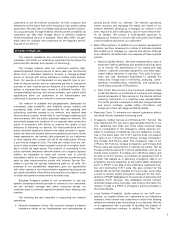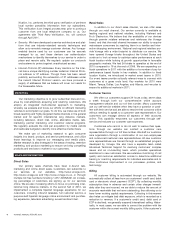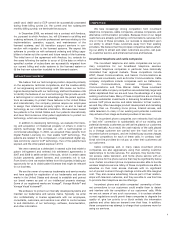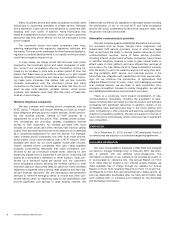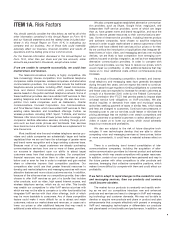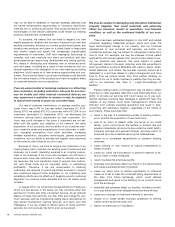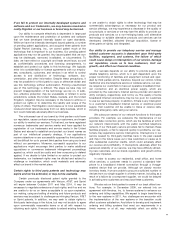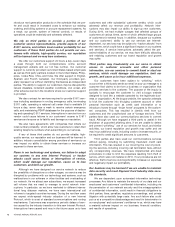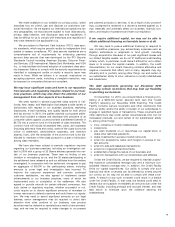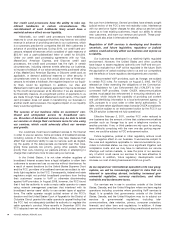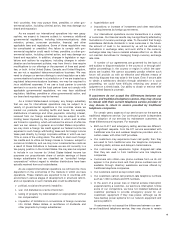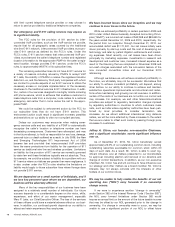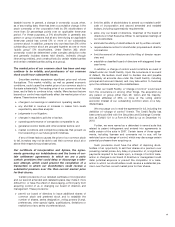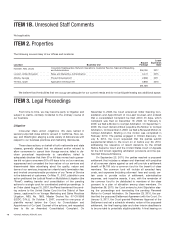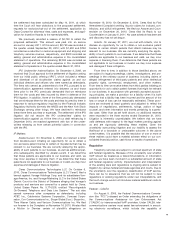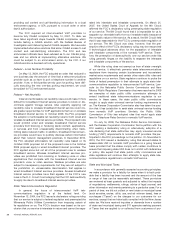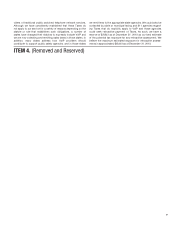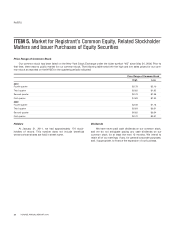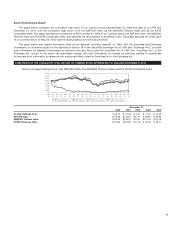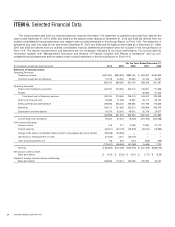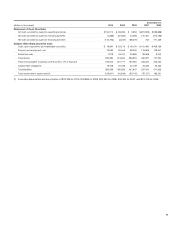Vonage 2010 Annual Report Download - page 22
Download and view the complete annual report
Please find page 22 of the 2010 Vonage annual report below. You can navigate through the pages in the report by either clicking on the pages listed below, or by using the keyword search tool below to find specific information within the annual report.their countries, they may pursue fines, penalties, or other gov-
ernmental action, includin
g
criminal action, that may dama
g
eou
r
b
rand and re
p
utation.
As we expand our international operations into new
g
eo
g-
r
a
p
hies, we ex
p
ect to become sub
j
ect to numerous additional
g
overnmental re
g
ulations, includin
g
telecommunications, dat
a
r
etention, privacy, consumer protection,
f
inancial, and othe
r
applicable laws and re
g
ulations. Some of these re
g
ulations may
b
e complicated or unsettled. Any
f
ailure to comply with
g
ov
-
ernmental re
g
ulation could result in
f
ines, penalties, or other
g
ov
-
ernmental action, includin
g
criminal action, and may dama
g
eou
r
b
rand and reputation. In addition, chan
g
es in le
g
islation or re
g
u
-
lations and actions by re
g
ulators, includin
g
chan
g
es in admin
-
istration and en
f
orcement policies, may
f
rom time to time require
modi
f
ications to our o
ff
erin
g
s or the payment o
ff
ines and penal
-
ties, or both. In the United States, Canada, and United Kin
g
dom
,
we are not a re
g
ulated telecommunications business. We ma
y
need to chan
g
e our service o
ff
erin
g
s to avoid re
g
ulation as a tele
-
communications business in a
j
urisdiction or i
f
we are treated as
a
r
e
g
ulated telecommunications business, we may be required t
o
incur additional ex
p
enses. I
f
we use a local
p
artner to
p
rovide
s
ervices in a country and the local partner does not comply wit
h
applicable
g
overnmental re
g
ulations, we may
f
ace additiona
l
r
e
g
u
l
at
i
on,
li
a
bili
t
i
es, pena
l
t
i
es or ot
h
er
g
overnmenta
l
act
i
on, an
d
our
b
ran
d
an
d
reputat
i
on ma
yb
e
h
arme
d
.
As a United States-based company, any foreign subsidiary
that we use
f
or international operations ma
y
be subject to
a
v
ariety o
f
governmental regulations in the countries where we
market our products, including tari
ff
s and taxes. For example
,
distributions of earnings and other payments, including interest
,
r
eceived from our foreign subsidiaries may be subject to with
-
h
o
ldi
ng taxes
i
mpose
db
yt
h
e
j
ur
i
s
di
ct
i
on
i
nw
hi
c
h
suc
h
ent
i
t
i
e
s
are formed or operating, which will reduce the amount of after-ta
x
cash we can receive. In general, as a United
S
tates corporation,
we may claim a foreign tax credit against our federal income ta
x
expense for such foreign withholding taxes and for foreign incom
e
taxes paid directly by foreign corporate entities in which we ow
n
10% or more of the voting stock. The ability to claim such foreig
n
tax credits and to utilize net foreign losses is, however, subject t
o
numerous
li
m
i
tat
i
ons, an
d
we ma
yi
ncur
i
ncrementa
l
tax costs a
s
a result of these limitations or because we are not currentl
y
in
a
tax-paying position in the United
S
tates. We may also be require
d
to include in our income for
U
nited
S
tates federal income tax
p
urposes our proportionate share of certain earnings of those
foreign subsidiaries that are classified as “controlled foreign
corporations” without regard to whether distributions have bee
n
actuall
y
received from such subsidiaries.
A
sweex
p
and international o
p
erations we will become mor
e
de
p
endent on the economies of the markets in which we hav
e
o
p
erations. These markets are ex
p
ected to be in countries wit
h
economies in various sta
g
es of development or structural reform
,
and our operations in such markets also could be a
ff
ected by
:
>
political, social and economic instability
;
>
w
ar
,
civil disturbance or acts o
f
terrorism
;
>
taking of property by nationalization or expropriation withou
t
f
air compensation
;
>
imposition o
f
limitations on conversions o
ff
orei
g
n currencie
s
into United States dollars or remittance of dividends an
d
o
ther payments by
f
orei
g
n subsidiaries
;
>
h
yperin
f
lation; an
d
>
impositions or increase of investment and other restrictions
o
r requirements by foreign governments.
O
ur international operations involve transactions in a variety
of currencies. Our financial results may be si
g
nificantly affected b
y
f
luctuations o
f
currency exchan
g
e rates. To the extent that
f
orei
gn
subsidiaries distribute dividends in local currencies in the
f
uture
,
t
he amount o
f
cash to be received by us will be a
ff
ected by
f
luctuations in exchan
g
e rates, and such shi
f
ts in the currency
exchan
g
e rates may have a material adverse e
ff
ect on us. We do
n
ot maintain derivatives
f
or mana
g
in
gf
orei
g
n currency exchan
ge
r
a
t
e
ri
s
k
s
.
A number of our agreements are governed by the laws of
,
and subject to dispute resolution in the courts of, or through arbi
-
t
rat
i
on procee
di
ngs
i
n, t
h
e country or reg
i
on
i
nw
hi
c
h
t
h
e oper-
at
i
ons are
l
ocate
d
.
W
e cannot accurate
ly
pre
di
ct w
h
et
h
er suc
h
forum will provide us with an effective and efficient means of
resolving disputes that may arise in the future. Even if we are abl
e
t
o obtain a satisfactory decision through arbitration or a court
proceeding, we could have difficulty enforcing any award o
r
j
udgment on a timely basis.
O
ur ability to obtain or enforce relief
i
n the
U
nited
S
tates is uncertain.
I
f
customers do not accept the di
ff
erences between ou
r
service and traditional tele
p
hone service, the
y
ma
y
choos
e
to rema
i
nw
i
t
h
t
h
e
i
r current te
l
ep
h
one serv
i
ce prov
id
er or
ma
y
choose to return to service
p
rovided b
y
traditiona
l
tele
p
hone com
p
anies
.
F
or certain users, aspects o
f
our service are not the same a
s
traditional telephone service.
O
ur continued growth is dependen
t
on the adoption of our services b
y
mainstream customers, so
these differences are important. For example
:
>
B
oth our E-911 and emer
g
ency callin
g
services are different
,
in si
g
nificant respects, from the 911 service associated wit
h
traditional wire line and wireless tele
p
hone
p
roviders and, i
n
c
ertain cases, with other VoIP
p
roviders.
>
O
ur customers ma
y
experience lower call qualit
y
than the
y
a
re used to from traditional wire line telephone companies
,
i
nc
l
u
di
ng stat
i
c, ec
h
oes, an
dd
e
l
ays
i
n transm
i
ss
i
ons
.
>
Our customers may experience hi
g
her dropped-call rate
s
than they are used to
f
rom traditional wire line telephone
c
om
p
anies
.
>
C
ustomers who obtain new
p
hone numbers from us do not
app
ear in the
p
hone book and their
p
hone numbers are no
t
a
vailable throu
g
h directory assistance services offered b
y
traditional tele
p
hone com
p
anies
.
>
O
ur customers cannot accept collect calls.
>
Our customers cannot call
p
remium-rate tele
p
hone number
s
suc
h
as
1-
900
n
u
m
be
r
sa
n
d9
7
6
n
u
m
be
r
s.
>
I
n the event of a
p
ower loss or Internet access interru
p
tion
e
xperienced by a customer, our service is interrupted. Unlik
e
some of our com
p
etitors, we have not installed batteries a
t
c
ustomer premises to provide emer
g
ency power for our
c
ustomers’ equipment if they lose power, althou
g
hwed
o
have backup power systems for our network equipment and
service
p
lat
f
orm.
I
f
customers do not acce
p
t the di
ff
erences between our serv
-
i
ce and traditional telephone service, they may choose to remai
n
15


